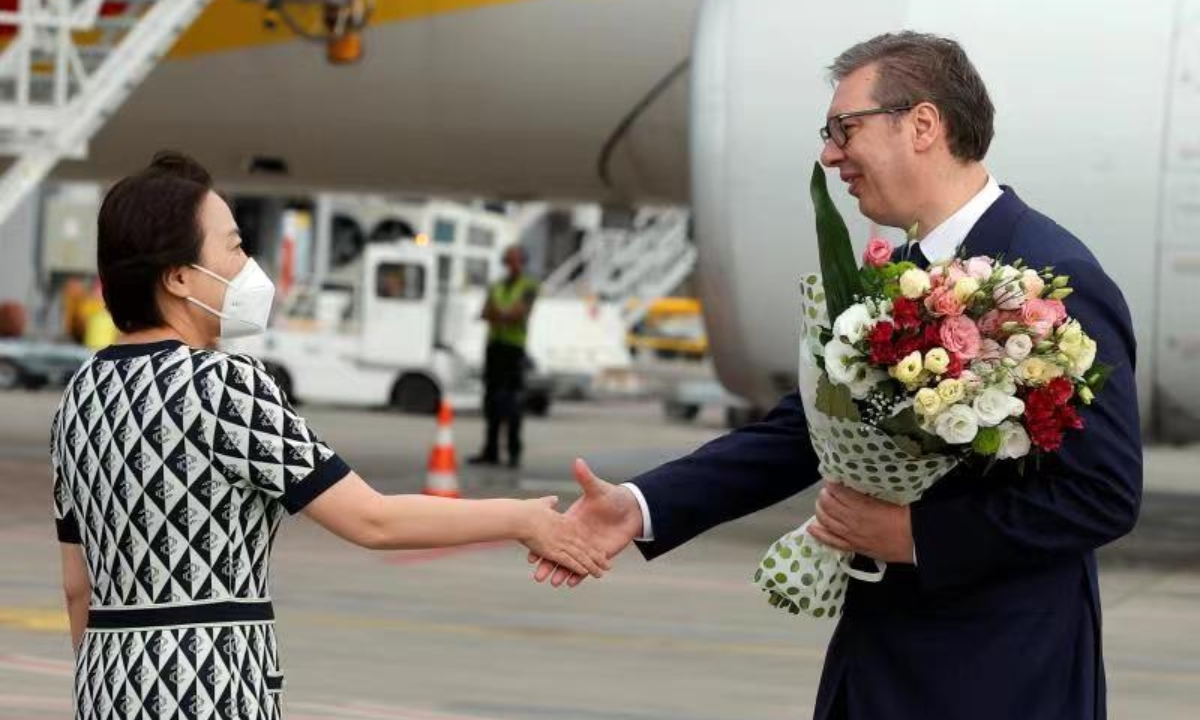China launches nonstop flights from Beijing to Belgrade amid closer tie-up with Central and Eastern Europe

Photo: Courtesy of Hainan Airlines
Chinese carrier Hainan Airlines on Saturday launched nonstop flights from Beijing to Belgrade, with the first flight greeted by Serbian President Aleksandar Vucic at a ceremony at the Belgrade Nikola Tesla Airport, as a fruitful tie-up between China and Central and Eastern Europe makes the case for greater connectivity.
"We will be able to attract even more tourists and businessmen from China, which will bring China even closer to Serbia," Vucic said while attending the ceremony, according to the Xinhua News Agency.
Chinese Ambassador to Serbia Chen Bo, who was among the passengers boarding the maiden flight, also attended the Saturday ceremony.
Regarding the direct flights as opening new opportunities for bilateral cooperation in all areas, Chen said that "the position of Serbia as a regional transport hub will be strengthened," Xinhua reported.
Serbia will never forget China's support in tough times and the availability of nonstop flights between the two countries is of great significance, as Serbia becomes the first country in the region to launch direct flights with China, Vucic was quoted as saying in a Saturday posting on the WeChat account of the Chinese Embassy in Serbia.
Air Serbia is also expected to launch direct flights linking the two countries within this year, Vucic said.
In a notable sign of bilateral friendship, construction of the first Chinese coronavirus vaccine production facility in the European continent began in Serbia in September 2021.
The facility, according to Xinhua, was anticipated to supply Serbia and some other countries in Europe with Chinese-developed Sinopharm vaccines. Vucic also laid the foundation stone for the new facility back then.
Serbia has been at the forefront of China's cooperation with Central and Eastern Europe, with increased partnerships with China on multiple fronts including trade and tourism justifying upgraded air links between the two countries, Cui Hongjian, director of the Department of European Studies at the China Institute of International Studies, told the Global Times on Sunday.
Cui cited China's vibrant infrastructure presence in Serbia spanning railway and steelworks that renders it ripe to restart the direct route.
The nonstop route, operated by Airbus wide-body jet A330, would be available Saturdays with one roundtrip flights, Hainan Airlines said in a statement sent to the Global Times.
It is one of the first intercontinental regular passenger routes that the Chinese carrier has resumed in Beijing since the pandemic outbreak.
Hainan Airlines opened the Beijing-Belgrade direct route with a stop at Prague in September 2017, which was halted in 2020 due to the coronavirus.
Hainan Airlines, with an early foothold in the European market, ideally suited for operating flight routes connecting Chinese cities and regional destinations in Europe, Cui said, adding that major European airlines seldom operate direct flights from Serbia, and consequently, the nonstop flights linking the Chinese and Serbian capitals, much of a rarity, fill the gap of rising direct flight needs.
The prospects of even closer trade ties between the two countries are considered to have necessitated more transport convenience.
Bilateral trade hit 5.3 billion euros ($5.35 billion) in 2021, and the volume of Serbia's exports to China increased 15 times over the past five years, Serbian Prime Minister Ana Brnabic revealed in March during the opening ceremony of the Chamber of Chinese Companies in Serbia, according to Xinhua.
During a phone conversation with his Serbian counterpart Nikola Selakovic in April, Chinese Foreign Minister Wang Yi said that China stands ready to work with Serbia to "accelerate the implementation of the important consensus reached by the two heads of state and the construction of the Novi Sad-Subotica section of the Budapest-Belgrade Railway, support the sound operation and development of key cooperative enterprises, and sign bilateral free trade agreement as soon as possible to inject strong impetus into cooperation and help Serbia further enhance its competitiveness."

